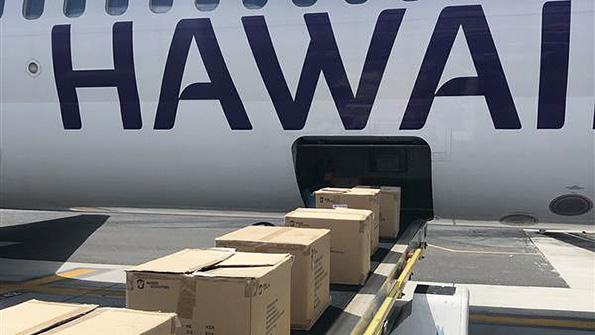
Amenity kits are loaded onto a Hawaiian Airlines aircraft to assist Maui residents affected by wildfires.
Drought and extreme heat set the stage for frequent wildfires across parts of North America and Europe during the summer months, causing widespread destruction and loss of life.
The immediate aftermath of the wildfires in Maui saw Hawaiian Airlines evacuate around 17,000 people from the island, add flights to transport essential cargo and supplies, and set up a relief fund for affected colleagues. Several more carriers also provided airlift, as well as supporting the vital aid efforts of partner organizations. It was a similar story in other parts of the world, where airlines rushed to adjust service and implement flexible cancellation policies to facilitate the evacuation process.
This year has seen carriers respond to numerous humanitarian crises, none more so than the devastating earthquakes that struck the border between southern Turkey and northern Syria in February. Turkish Airlines evacuated almost 300,000 people from the region in the following weeks, while other airline partners supported relief organization Airlink to mobilize personnel and resources to the area. Without question, aviation helped to save lives and continues to assist the recovery.
Each day, airlines make a vast positive contribution to humanity and trade by connecting people, cultures, businesses and economies. And, when disaster strikes, these links become even more critical, a factor plainly evident during the pandemic, when airlines were also essential to delivering medical equipment and vaccines. However, even though aviation serves as a dependable ally to governments during times of distress, the industry’s role as a force for good is often forgotten during calmer periods.
Government interference in Mexico and the Netherlands are prime examples. In Mexico, political leaders are further shrinking airline capacity at the country’s main gateway at Mexico City International Airport this winter, reducing the number of hourly slots from 52 to 43. Likewise, the Dutch government has won permission to curtail air service at Amsterdam Schiphol due to noise issues—a decision KLM has described as “incomprehensible.”
Elsewhere, a draft ministerial decree in Belgium has outlined a proposed ban on night flights at Brussels Zaventem Airport, while in France, a country that already has bans on domestic flights on routes for which a rail alternative of under 2.5 hours exists, moves are also afoot to increase taxes on air tickets to boost investment in the rail sector.
Culling capacity at major hubs serves only to stifle connectivity, limit travel options for passengers, and push air fares higher. This in turn reduces demand and makes flying something for the rich and privileged.
For the aviation sector to transition to its net zero goal, governments around the world must be active and supportive participants. Fostering and helping finance an environment that encourages responsible growth and incentivizes technological innovation will not only ensure a more sustainable future, but also maintain and grow the levels of connectivity that society needs. Limiting flights and raising taxes achieves neither.
